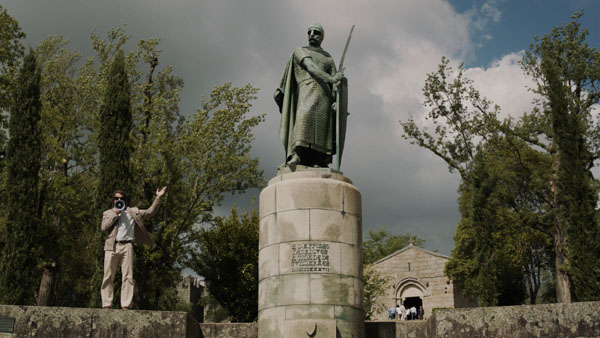The occasion is a run at New York’s Anthology Film Archives, and we begin with Nicolas Rapold in the Times: “Centro Histórico, commissioned to promote the Portuguese city of Guimarães as a 2012 European Capital of Culture, groups short films from a deadpan Finnish director (Aki Kaurismäki), a Basque neighbor (Víctor Erice, in documentary mode) and two native sons (Pedro Costa and Manoel de Oliveira) who happily continue to direct exactly as they wish.”
In order of appearance, “Mr. Kaurismäki’s Tavern Man imagines, not very memorably, the silent-film routine of a waiter-proprietor (Ilkka Koivula) at a cafe that’s slightly but decisively off the beaten path,” writes Rapold. “Mr. Costa’s contribution,” Sweet Exorcist, “is a stringent, heady, narcotic passage that brooks no stragglers.”
At Artinfo, J. Hoberman finds it “interminable, stupefying (but not exactly dismissible).” But for the New Yorker‘s Richard Brody, Sweet Exorcist is one of two “standouts.” Ventura, “the elderly Cape Verdean immigrant” of Colossal Youth (2006), “wanders through haunted underbrush and arrives at a hospital, where, in the elevator, he encounters the statue of a soldier—with whom he enters into a dialogue about the country’s 1974 military coup, the vestigial dreams of his homeland, and the enduring legend of revolution that survives like a secular vision of redemption.”
Daniel Kasman from Rotterdam in January: “All shot in digital HD—Costa’s first use of it, to my knowledge—Sweet Exorcist, as it is called, shocked me anew with each image, as the director’s work did upon my first encounter with it.”
“Best by far,” finds Hoberman, “is Spanish director Víctor Erice’s simple, straight-forward oral history of a once huge, now derelict textile factory in which, standing before his static camera, a dozen or so workers brief recount their life stories and thus provide a collective portrait of a vanished working class.” The title is Vidros Partidos (Broken Windows).
In The Conqueror, Conquered, Oliveira “takes an aptly long and Olympian view of history, following a tour guide (Ricardo Trêpa) as he leads his flock of tourists to the city’s medieval highlights and delivers potted introductions in broken English,” writes Richard Brody. “Oliveira offers a simple and rarefied lesson in vision, finding blazingly clear angles to reveal ancient wonders in a renewed immediacy, to look ancient heroes in the face, and to take their point of view—visual and historical, whimsical yet hopeless—against the undiscerning modern crowd.”
Eric Hynes for Time Out New York: “Though strong, the Costa and Erice submissions seem better suited as rigorous stand-alones, making the Kaurismäki and De Oliveira chapters feel both welcome and trifling by comparison. They’re all worthy slices—even if none seem essential to the whole.”
When Centro Histórico opened the Rome Film Festival last fall, we collected reviews from Jessica Kiang (Playlist), Jordan Mintzer (Hollywood Reporter), and Jay Weissberg (Variety). And for more, see Critics Round Up.
Update, 7/21: Here in Keyframe, Aaron Cutler notes that “many critics have dismissed Oliveira’s ten-minute closer as an irrelevant trifle in comparison to the shorts preceding it. But although The Conquered Conqueror functions as a grace note, it also comments on the preservation of human memory in a moving, self-sufficient way indicative of its filmmaker.”
For news and tips throughout the day every day, follow @KeyframeDaily on Twitter and/or the RSS feed. Get Keyframe Daily in your inbox by signing in at fandor.com/daily.




